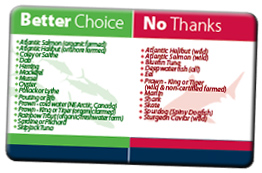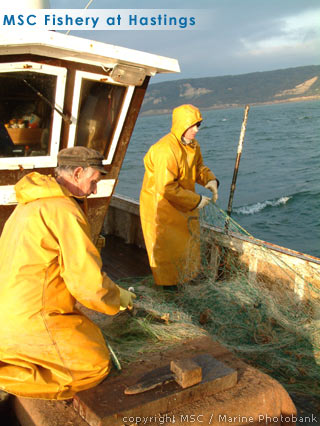An overview of seafood guides around the world. Last updated on November 3, 2011
(you are in: overfishing.org / articles / sea food guides)
You decided you want to eat fish and shellfish from fisheries that do not have an averse effect on the ocean or coastal waters. Sustainably caught or sustainably farmed fish so to say. Is this possible? The short answer is yes. The somewhat longer answer is yes, but as long as you make sure the fish is from a healthy population and harvested in a sustainable and non-destructive (precautionary) manner.

In case of farmed / fattened fish (aquaculture, mariculture) the fish or shellfish should not be fed with endangered wild fish The irony of fishfarming: many fish (e.g. cod, salmon, trout) are carnivorous, thus eating other fish (or whatever meat mixture they get in a farm). E.g. it takes >5kg (and up to a hundred kg) of feed fish to produce one kg of farmed Salmon. and the farm should not be an ecological hazard (e.g. pollution, risk of escaping fish) to the surrounding environment (including wild fish populations). As a rule of thumb we can also say that locally caught or locally raised fish and shellfish is more sustainable than fish caught or raised far away in a different country or continent.
Ideally no bad fish would be for sale but until that day comes it is best to be informed. As it's impossible for every consumer to do the full research "Good fish guides" or "Seafood guides" are practical tools in making smart choices.
A number of Non Governmental Organisations (NGOs) maintain seafood guides / lists on fish to eat and to avoid. Aimed at consumers these lists are usually based on a simple colour system with green being good and red being bad. Not all list are of the same quality and not all NGOs follow the same methodology. In general these list do provide a good and easy buyers or consumers guide overview. Print a list on a small credit card sized piece of paper, stick it in you wallet, and always carry your environmentally friendly fish list with you!
This overview is not as comprehensive as it can be and contributions, especially for new countries, are welcomed!
For many countries no special guide is maintained. Seafoodchoices.org is a good starting point providing information on fish species, restaurants and suppliers. While maybe not directly developed for a certain country some of the guides mentioned above could be a good and useful start for guide-less countries nearby as well. For Europeans the international seafood red list maintained by Greenpeace International is a good starting point.
Eco labels are based on the concept of consuming without detrimental effects on the environment. The precautionary principle is key in this. The Marine Stewardship Council (MSC) standard is currently the only internationally used eco label for fish and shellfish. Before becoming the independent organisation it is now the MSC was founded by Unilever and WWF. The MSC label promotes "responsible use" but it is not without flaws. Fisheries, and from fish derived products, have to go trough a regular assessment in order to keep their MSC accreditation.
The MSC standard is given to fisheries acknowledged to be sustainable according to the three MSC principles. The organisation defines sustainable as „target fish populations are at healthy levels, sometimes having recovered from being depleted in the past. A well-managed fishery will ensure that there is a future for the industry and all those who depend on the fisheries for their livelihoods”. The three principles and the assessment scheme are somewhat based on the FAO guidelines for the eco labelling of fish. FAO guidelines for the ecolabelling of fish and fishery products from marine capture fisheries. ftp://fao.org/...a0116t00.pdf

Although a number of problems with individual fisheries have been seen in the past and even today (one problem is that fisheries on the path to sustainability are sometimes already given the label..) the MSC label is the most recognisable eco label for fish and shellfish we currently have in the world. It is not perfect though.
If you are specifically looking for a certain species of fish than buying fish labelled as coming from an MSC accredited source is favourable over fish with no label. However, it is even better if you take the advice from a seafood guide (like the ones mentioned on this page) and go with that.
Overfishing.org - All content, unless stated otherwise, are Copyright 2007-2012 Pepijn Koster.